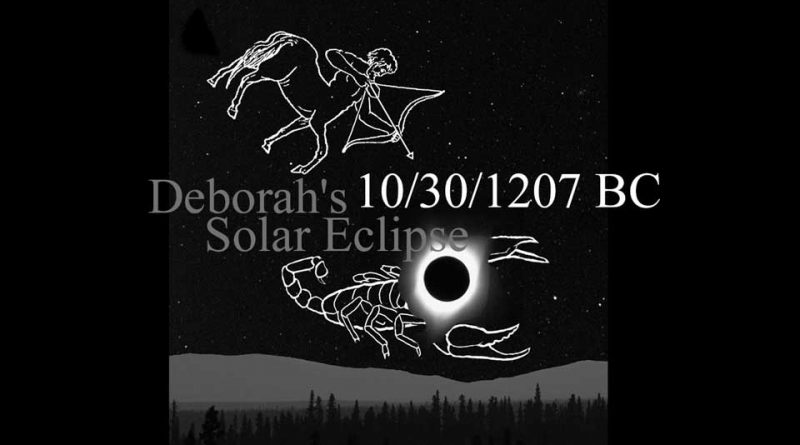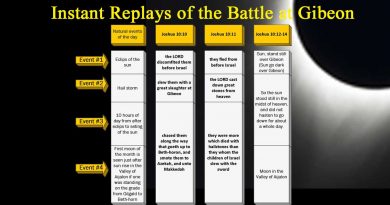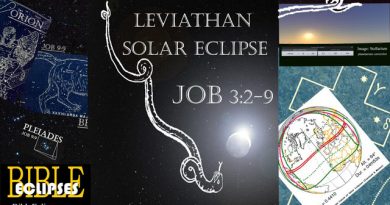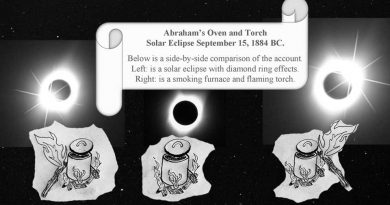Deborah Solar Eclipse 30 October 1207 BC
After 20 years of oppression, Israel’s third Judge received guidance from God. Deborah witnessed the stars fighting at 4:45 PM on October 30, 1207 BC. The constellation Scorpius had the sun located on its head. About one hour before sunset, the sun became eclipsed by the moon, resulting in a 91% eclipse. Deborah knew the constellations Sagittarius had a celestial arrow pointed at Scorpius’s head. Deborah believed the arrow was released and delivered a fatal blow to the scorpion. This attack is represented by the solar eclipse occurring on the scorpion’s head. Deborah then noticed that the now-dead Scorpion constellation completely disappeared, swept away by the horizon, leaving the Sagittarius constellation fully visible in the night sky as the battle champion.
Deborah paralleled this celestial fight to Israel’s battle against Sisera. Deborah believed that the Archer constellation Sagittarius represented Israel, and the constellation Scorpius represented their enemy Sisera. Deborah interpreted this cosmic battle to mean that Israel was to go to battle against Sisera. The battle would result in Sisera’s defeat and death, being fatally impaled in the head, represented by the sun’s eclipse on the scorpion’s head. Further, Deborah prophesied that Sisera’s army would be swept down the river, symbolized by the constellation being swept out of the sky at sunset. Finally, Deborah prophesied that Israel would be victorious after seeing the constellation representing Israel was observable in the night sky.
Deborah summoned Barak and informed him that God fought from the heavens (Judges 5:20), “From heaven fought the stars, from their courses they fought against Sisera.” Barak believed Deborah but did not have the knowledge to understand the stars, resulting in Barak’s hesitation to go without Deborah.
Adam Clarke stated, “the Septuagint made a remarkable addition to the speech of Barak: ‘If thou wilt go with me I will go; but if thou wilt not go with me, I will not go; because I know not the day in which the Lord will send his angel to give me success.’ By which he appears to mean, that although he was certain of a divine call to this work, yet, as he knew not the time in which it would be proper for him to make the attack, he wished that Deborah, on whom the Divine Spirit constantly rested, would accompany him to let him know when to strike that blow, which he knew would be decisive.”[1]
The Septuagint notation of “the Lord will send his angel to give me success” indicates that this angel would most likely be the angel Deborah saw fighting in the stars represented by the constellation Sagittarius. The prophetic battle occurred at 4:45 PM on October 30, 1207 BC, and now the angel warrior will come down to earth to fulfill the prophecy.
Barak did not understand the event in the sky at 4:45 PM on October 30, 1207 BC. Barak concluded that he would need Deborah to come with him to decipher the will of God. Deborah went with Barak and was able to assist with the relaying of God’s will to Barak.
When the time was correct, Deborah told Barak the day the Lord had chosen was now, for God had gone out before them, demonstrated in the earlier eclipse. Judges 4:14 says, “And Deborah said unto Barak, Up; for this is the day in which Jehovah hath delivered Sisera into thy hand; is not Jehovah gone out before thee? So Barak went down from mount Tabor, and ten thousand men after him.”
Deborah’s celestial vision ended with Scorpio’s death and subsequential sweeping away by the earth’s horizon, so also on earth, Sisera’s army was washed away by the river just as Deborah prophesied. The fact that this river was flowing indicates that the battle occurred in the year’s rainy season. With the eclipse calling Judah to the war on October 30, the battle probably occurred from December to January. The river flowing and eclipse in the late fall give strength to each other.
Sisera died the same way the Scorpion constellation died in the celestial war. The scorpion constellation died with Sagittarius shooting an arrow into Scorpio’s head, symbolized by the solar eclipse on Scorpio’s head. The earthly battle unfolded the same way the celestial battle did. Sisera was impaled by a tent stake to the head just as the scorpion took an arrow to the head in the prophecy. Sisera’s army was then swept away by the river just as Scorpio in the heavens was swept away by the earth’s horizon.
Deborah’s poem of the events concludes with the observation, “So let all thine enemies perish, O Jehovah: But let them that love him be as the sun when he goeth forth in his might. And the land had rest forty years” (Judges 5:31). Deborah associated the sun going dim during the solar eclipse with Sisera’s symbolic death. Deborah continued by comparing Israel’s renewed life in the unobstructed sunlight.
[1] Adam Clarke, The Holy Bible: A Commentary and Critical Notes, Vol. II, Joshua to Esther (New York: Lane & Sandford, 1842), p. 117.




